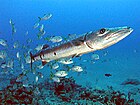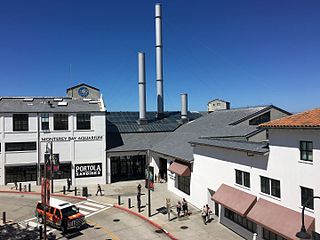
Monterey Bay Aquarium is a nonprofit public aquarium in Monterey, California. Known for its regional focus on the marine habitats of Monterey Bay, it was the first to exhibit a living kelp forest when it opened in October 1984. Its biologists have pioneered the animal husbandry of jellyfish and it was the first to successfully care for and display a great white shark. The organization's research and conservation efforts also focus on sea otters, various birds, and tunas. Seafood Watch, a sustainable seafood advisory list published by the aquarium beginning in 1999, has influenced the discussion surrounding sustainable seafood.

A conventional idea of a sustainable fishery is that it is one that is harvested at a sustainable rate, where the fish population does not decline over time because of fishing practices. Sustainability in fisheries combines theoretical disciplines, such as the population dynamics of fisheries, with practical strategies, such as avoiding overfishing through techniques such as individual fishing quotas, curtailing destructive and illegal fishing practices by lobbying for appropriate law and policy, setting up protected areas, restoring collapsed fisheries, incorporating all externalities involved in harvesting marine ecosystems into fishery economics, educating stakeholders and the wider public, and developing independent certification programs.
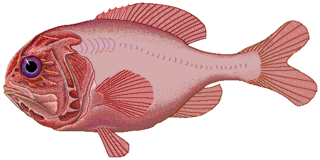
The orange roughy, also known as the red roughy, slimehead and deep sea perch, is a relatively large deep-sea fish belonging to the slimehead family (Trachichthyidae). The UK Marine Conservation Society has categorized orange roughy as "vulnerable to exploitation". It is found in 3 to 9 °C, deep waters of the Western Pacific Ocean, eastern Atlantic Ocean, Indo-Pacific, and in the eastern Pacific off Chile. The orange roughy is notable for its extraordinary lifespan, attaining over 200 years. It is important to commercial deep-trawl fisheries. The fish is a bright, brick-red color, fading to a yellowish-orange after death.
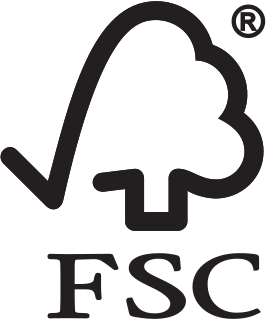
The Forest Stewardship Council (FSC) is an international non-profit, multistakeholder organization established in 1993 that promotes responsible management of the world's forests. It is an example of a market-based certification program used as a transnational environmental policy.

The Marine Stewardship Council (MSC) is an independent non-profit organization which sets a standard for sustainable fishing. Fisheries that wish to demonstrate they are well-managed and sustainable compared to the MSC's standards are assessed by a team of experts who are purportedly independent of both the fishery and the MSC. However, there are serious doubts about its credibility, with critics claiming that the Council has certified fisheries that are harming the environment and those with a high level of bycatch, the killing of non-target species such as dolphins and turtles. These concerns are furthered by the fact that the industry pays the MSC to be certified, which presents itself as a conflict of interest. In addition, there is no guarantee that the seafood is ethical, as animal welfare is not considered and slow, excruciating suffocation is still the standard slaughter method for fish, who possess not only the ability to feel pain but emotions and sentience.
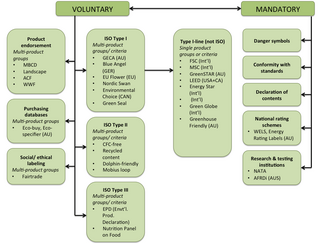
Eco-labels and Green Stickers are labeling systems for food and consumer products. Ecolabels are voluntary, but green stickers are mandated by law; for example, in North America major appliances and automobiles use Energy Star. They are a form of sustainability measurement directed at consumers, intended to make it easy to take environmental concerns into account when shopping. Some labels quantify pollution or energy consumption by way of index scores or units of measurement, while others assert compliance with a set of practices or minimum requirements for sustainability or reduction of harm to the environment. Many ecolabels are focused on minimising the negative ecological impacts of primary production or resource extraction in a given sector or commodity through a set of good practices that are captured in a sustainability standard. Through a verification process, usually referred to as "certification", a farm, forest, fishery, or mine can show that it complies with a standard and earn the right to sell its products as certified through the supply chain, often resulting in a consumer-facing ecolabel.
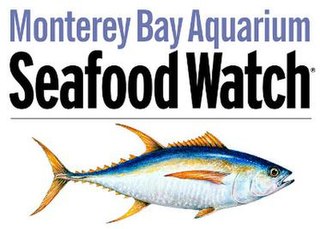
Seafood Watch is one of the best known sustainable seafood advisory lists, and has influenced similar programs around the world. It is best known for developing science-based seafood recommendations that consumers, chefs, and business professionals use to inform their seafood purchasing decisions.
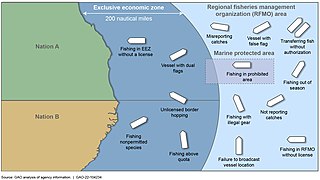
Illegal, unreported and unregulated fishing (IUU) is an issue around the world. Fishing industry observers believe IUU occurs in most fisheries, and accounts for up to 30% of total catches in some important fisheries.
Sustainable seafood is seafood that is caught or farmed in ways that consider the long-term vitality of harvested species and the well-being of the oceans, as well as the livelihoods of fisheries-dependent communities. It was first promoted through the sustainable seafood movement which began in the 1990s. This operation highlights overfishing and environmentally destructive fishing methods. Through a number of initiatives, the movement has increased awareness and raised concerns over the way our seafood is obtained.
Rick Moonen is an American seafood chef and an early adopter of sustainable fishing practices. He is known as the "Godfather of Sustainability".
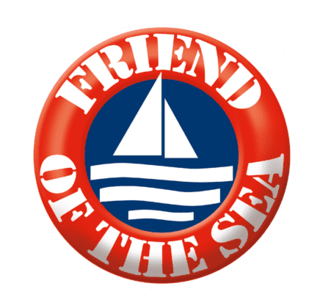
Friend of the Sea is a project of the World Sustainability Organization for the certification and promotion of seafood from sustainable fisheries and sustainable aquaculture. It is the only certification scheme which, with the same logo, certifies both wild and farmed seafood.
Sustainable seafood advisory lists and certification are programs aimed at increasing consumer awareness of the environmental impact and sustainability of their seafood purchasing choices.
SeaWeb is a nonprofit ocean conservation organization. Their mission is to raise public awareness, to advance science-based solutions and mobilize decision-makers around ocean conservation. SeaWeb was founded in 1996 by the Environment Group of the Pew Charitable Trust as an initiative to promote ocean conservation issues for Americans. In 1999, SeaWeb became an independent 501(c)3 organization, funded mostly from private charitable foundations, but also from individual contributions. In 2015, SeaWeb became part of The Ocean Foundation.
Sustainable sushi is sushi made from fished or farmed sources that can be maintained or whose future production does not significantly jeopardize the ecosystems from which it is acquired. Concerns over the sustainability of sushi ingredients arise from greater concerns over environmental, economic and social stability, and human health.
Sustainability standards and certifications are voluntary guidelines used by producers, manufacturers, traders, retailers, and service providers to demonstrate their commitment to good environmental, social, ethical, and food safety practices. There are over 400 such standards across the world. The trend started in the late 1980s and 90s with the introduction of Ecolabels and standards for Organic food and other products. Most standards refer to the triple bottom line of environmental quality, social equity, and economic prosperity. A standard is normally developed by a broad range of stakeholders and experts in a particular sector and includes a set of practices or criteria for how a crop should be sustainably grown or a resource should be ethically harvested. This might cover, for instance, responsible fishing practices that don't endanger marine biodiversity, or respect for human rights and the payment of fair wages on a coffee or tea plantation. Normally sustainability standards are accompanied by a verification process - often referred to as "certification" - to evaluate that an enterprise complies with a standard, as well as a traceability process for certified products to be sold along the supply chain, often resulting in a consumer-facing label. Certification programmes also focus on capacity building and working with partners and other organisations to support smallholders or disadvantaged producers to make the social and environmental improvements needed to meet the standard.
Barton Seaver is an author, speaker and chef. He works and resides in the state of Maine.

Living Oceans Society is a Canadian environmental organization that has been a leader in the effort to protect Canada's oceans since 1998. It is based in Sointula, British Columbia, with a satellite office in Vancouver, British Columbia. Living Oceans Society's vision states that: Canada's oceans are sustainably managed and thriving with abundant sea life that supports vibrant and resilient communities.
The following outline is provided as an overview of and topical guide to fisheries:
The Aquaculture Stewardship Council (ASC) is an independent non-profit organisation and labelling organization that establishes protocol on farmed seafood while ensuring sustainable aquaculture. The ASC provides producers with a certification of environmental sustainability and social responsibility.

Julie E. Packard is an American ocean conservationist and philanthropist. She helped create the Monterey Bay Aquarium in the early 1980s and is its executive director, a position she has held since its opening in 1984. She speaks at conferences and symposia related to ocean conservation, and writes online about current issues. She is a fellow of the American Academy of Arts and Sciences and is a recipient of the Audubon Medal.











